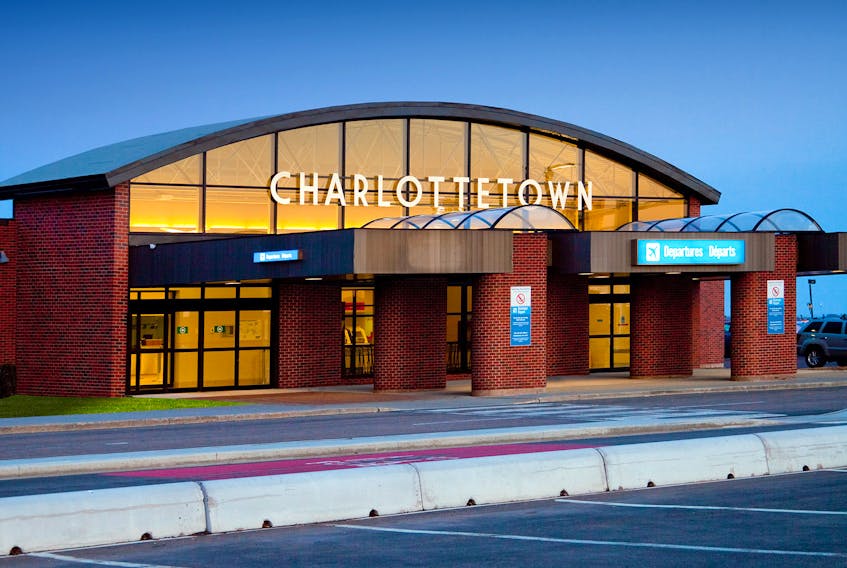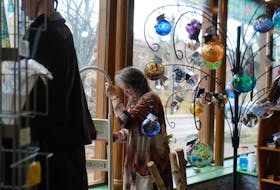A year ago, Doug Newson would have seen more than 55,000 passengers pass through the Charlottetown airport in April and May combined.
This year, only 1,625 passengers passed through the airport during those months – a 97 per cent drop compared to last year – due to the coronavirus (COVID-19 strain) pandemic.
Except for some commissionaires and custom officers, the airport is much quieter these days, and there are times during the day when you're likely to see the lights off.
The airport is down to an Air Canada daily direct flight to Toronto, and two WestJet Toronto flights a week.
"It is very strange, and sad, to be honest," said Newson, CEO of the Charlottetown Airport Authority since 2007.
This wasn't the summer the airport was planning for prior to COVID-19.

Newson recalled a board meeting on March 10 that involved quite different challenges with passenger numbers for the upcoming season. They were expected to be very high, and plans were underway for a terminal expansion to accommodate the increase in passengers.
"I think COVID-19 had one or two slides in a presentation to the board, that this is sort of starting to impact travel around the globe but we were expecting P.E.I. to be a popular tourism destination this summer because it was relatively quiet in Canada," said Newson.
That was March 10. And then, by the time the end of that week came, a lot of people were cancelling plans for March break travel.
"(COVID-19) did come quickly even though we knew it was out there. I don't think any of us could have predicted what we're dealing with today. But we're here now, and we'll deal with it and start looking at the recovery and what the future might look like."
Newson said being a business leader during the pandemic has been a challenge since these are unprecedented times and there is no playbook on how to operate. He keeps up to date on the chief public health officer's announcements and provincial and federal government travel regulations and restrictions.
"(COVID-19) did come quickly even though we knew it was out there. I don't think any of us could have predicted what we're dealing with today. But we're here now, and we'll deal with it and start looking at the recovery and what the future might look like."
He also keeps in contact with the airlines about their plans to add or decrease flights.
The strategy has been, and is, to be upbeat that things will recover, and be open and transparent with staff and the public since the airport is an essential piece of infrastructure that affects jobs and everyday lives.
"I've learned that people are counting on you to make decisions, but you can't do them all on your own or in a silo. You have to work with your team and the people around you to make sure that you're all working in the same direction and that you're working together to get through this," Newson said.
Until recently, people would have also likely seen the lights off at Charlottetown's Startup Zone if they passed by and peered through the organization's large, street-level windows on the corner of Queen and Water streets.
Prior to COVID-19, people would have also seen a buzz of activity from several startup companies working diligently to build their businesses. But like many other businesses and organizations, Startup Zone, which is celebrating its fourth year this month, temporarily shut its doors in March.
Patrick Farrar, Startup Zone's CEO, has been with the organization for about two of those four years. When the news broke that the doors were temporarily closing, Farrar reached out to the resident companies for one-on-one conversations.

Farrar said he was impressed with how the resident startup companies responded to the crisis. Recently, the organization surveyed its resident companies and found 80 per cent were still active. Technology-based companies have especially fared well during the pandemic as more people embrace technology and rely on their computers as a way of doing things.
"There's two different attitutes. There's people who thrive off that sort of thing. So, these entrepreneurs who step up to the challenge and look for the opportunity in challenging times like this, that's been really interesting to see a lot of businesses pivot or more likely change their customer segment. That's probably been the biggest thing we've seen," he said.
COVID-19's arrival was on Startup Zone's radar. It was also on Farrar's radar as early as January when he was travelling in India. As COVID-19 impacted other places, he kept in touch with similar organizations and partners in Canada and on the Island to share information and solutions about how to respond and prepare for COVID-19.
Even so, the pandemic's impact was still a surprise to a lot of people, and as a result, led to tough situations for some of the organization's resident companies.
"We've also had to have a lot of difficult conversations with some businesses that might be in the tourism industry, or otherwise, on how they can change up their business model. I would say most companies do have a new plan in place and are adapting from what they were previously planning back in February and March," Farrar said.
It's been longer days for Farrar since the pandemic hit, and the focus during these times has been on telling inspiring business stories about resident companies and learning from how they are adapting.
Startup Zone reopened on June 1, and the organization is getting back up to capacity as resident companies start making their way back to the work space. Farrar is even seeing a few local executives using the space to work away from home and access a better internet connection.
Similar to Newson, Farrar said he has been able to lead with the support of his team and board of directors.
What stands out for Farrar in the past couple of months? Everyone's attitute, he said.
"I think we've all been shaken up by this. There's times when we might fall down, and there is always somebody else there to pick you up. So, you see this community of people supporting one another. It's tough to be on all the time, 100 per cent, especially during times like this," he said.
"It's just been amazing to see the community support people."









